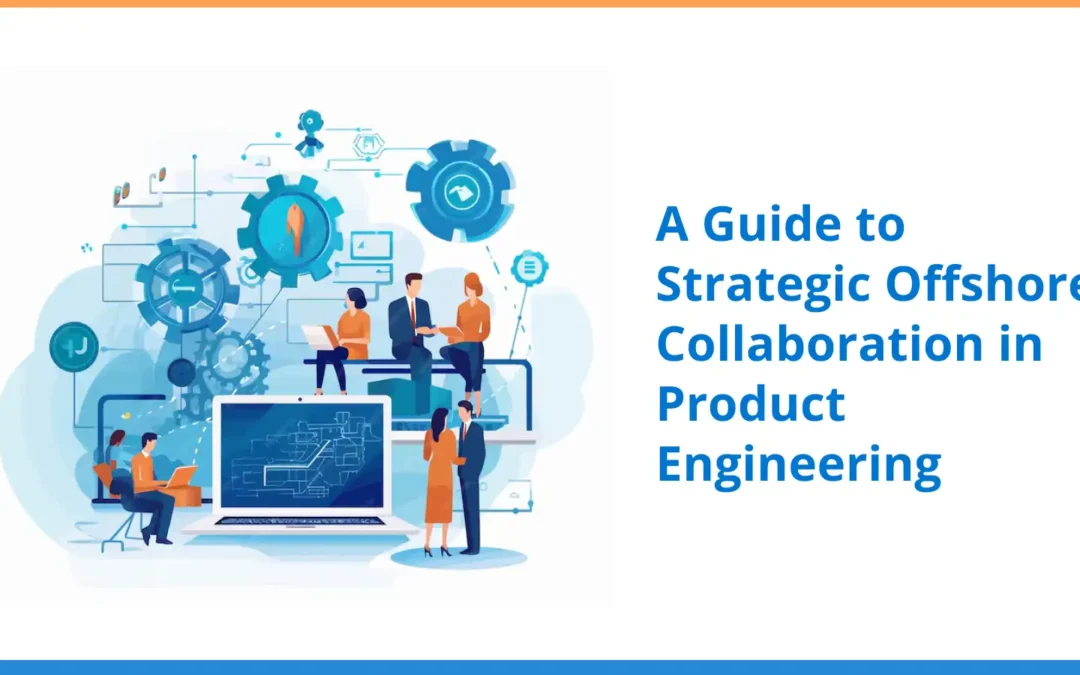The product engineering landscape is constantly evolving, and offshore development teams have become a valuable asset. They offer expertise, cost-effectiveness, faster development cycles, and access to a wider talent pool. However, not all aspects of product engineering are ideal for offshoring. This blog explores suitable tasks and offers strategies to ensure a successful strategic offshore collaboration.
Suitable Tasks for Strategic Offshore Collaboration

- Well-Defined Features: When features have clear specifications, user stories, and functionalities, offshoring development is highly efficient due to minimal communication and change management needs.
- Maintenance and Bug Fixes: Offshore teams excel at maintaining existing codebases, addressing bugs, and performing routine maintenance due to their experience with standardized coding practices.
- Quality Assurance (QA) Testing: They can complement your in-house QA efforts by performing rigorous testing across platforms and devices, ensuring a seamless global product experience.
- Specific Technical Expertise: If you lack specialized skills in your local market, partnering with an offshore team can provide access to programming languages, frameworks, or niche technologies.
When Collaboration Might Not Be Ideal

- Early Stage Development: When the product vision is evolving and user requirements are being refined, close collaboration and rapid iteration are crucial. Keeping development in-house allows for essential direct communication.
- Highly Complex and Innovative Features: Groundbreaking features often require close collaboration between designers, engineers, and product managers. Real-time brainstorming, rapid prototyping, and continuous feedback loops might be better served by an in-house team.
- Tasks Requiring Deep Domain Knowledge: Features requiring extensive knowledge specific to your industry or market might present challenges for offshore teams due to the learning curve impacting timelines and efficiency.
Optimizing Strategic Offshore Collaboration for Success

- Clear Communication and Defined Expectations: Establish clear communication channels, expectations, and utilize project management and video conferencing tools to ensure everyone is aligned.
- Detailed Documentation and Specifications: Provide comprehensive documentation like user stories, wireframes, technical specifications, and API references for a smoother development process.
- Agile Development Methodologies: Embrace methodologies like Scrum or Kanban to promote iterative development cycles with frequent deployments and feedback loops, allowing for closer collaboration and quicker course correction.
- Strong Project Management: Implement robust project management practices with clear task breakdowns, progress tracking, and deadline management to identify roadblocks proactively.
- Cultural Sensitivity and Understanding: Recognize cultural differences and encourage clear communication styles, flexible working hours, and a respectful work environment.
Beyond Development: Building a Long-Term Strategic Offshore Partnership

- Invest in Team Building: Organize virtual team-building activities to foster collaboration, build stronger relationships, and improve communication.
- Ongoing Training and Knowledge Sharing: Offer training programs or knowledge-sharing sessions to help the offshore team stay up-to-date with your product, technologies, and development processes.
- Regular Performance Reviews: Conduct regular reviews to assess effectiveness, identify areas for improvement, and provide constructive feedback.
- Focus on Client Success: Your success is intertwined with your offshore partner’s success. Provide ongoing support and resources to ensure high-quality work and desired outcomes.
Conclusion

By strategically leveraging offshore development teams for suitable tasks, product engineering teams can optimize processes, streamline development cycles, and access a wider talent pool. However, success hinges on clear communication, defined expectations, and a commitment to building a collaborative partnership.
Additional Considerations
As your working relationship strengthens, consider expanding the scope of your strategic offshore collaboration to include:
- Product Maintenance and Support: Offshore teams can handle bug fixes, user queries, and minor feature updates after launch.
- Data Analysis and Reporting: They can analyze user data, identify trends, and generate reports to inform future product decisions.
- Content Creation and Localization: For global product launches, offshore teams can assist with content creation and localization efforts.
Remember, the decision to offshore should be strategic, considering the specific task and your team’s capabilities. By thoughtfully integrating offshore development, you can unlock a world of possibilities and empower your team to achieve exceptional results.
Additional Resources:
